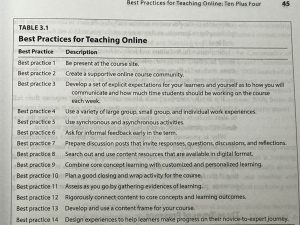I know that we are all having tons of fun with Canvas right now, but I thought week two might be a good time to take a look at some ideas from a new addition to the PDP library: The Online Teaching Survival Guide: Simple and Practical Pedagogical Tips.
Although the book targets beginning to intermediate level online instructors (I have no idea what that means — I have been teaching online in some form another for more than a decade and would still rate myself “beginning”), I have found this comprehensive overview a very useful tool for thinking about my own approaches, improving what I have, and developing new ideas. You can read a copy of the Table of Contents on the publisher’s page (just scroll down).
Discussing Some “Best Practices”
The book is filled with interesting and useful resources, but this list of key principles struck me as a good starting point for thought and conversation among our joyful readership:

I am hoping that some of you will share your thoughts with me in response to this list either via email or by commenting on the blog post version of this message.
Possible Response Questions
Do you have a technique you use to implement one of these principles which you have found particularly effective?
Is there a practice here that you think is particularly important? Could you tell us why?
Is there a practice in here that you do not consider essential (or even productive). Could you tell us why?
Is there something else you would like to share that is three to four thousand times more interesting than any of these prompts?
Could you explain to your colleagues who invented liquid soap and why?
By sharing your thoughts and reactions, you can help develop a conversation that we could all benefit from.
I Want, I Want!
PDP Library Loan
If you are thinking you would like to see this book for yourself, then you are welcome to drop by the PDP office where I will begrudgingly share it with you if you promise, promise, promise to bring it back really, really, really soon. I am thinking a one week borrowing period so others can see it too…
Save Us Library Heroes!
Our librarian super friends are working feverishly as I type this message to obtain an electronic copy of this Online Teaching Survival Guide that would be easier for us to share and / or share parts of. No pressure, super friends!
Buy Your Own Dang Copy
Of course, you can also grab a copy of your own Online Teaching Survival Guide at Amazon or some other website that is attempting to rule the world.
I have been having fun with the kindle version — which makes me feel very twenty-first century. But I actually catch myself spending more time reading the “hard copy” in the PDP office. This paradox makes sense if you remember that when I was a child we rode our dinosaurs to church on Sunday.
I look forward to reading your ideas and reactions to this message
Prepostero
PDP Coordinator
I think all of these are important to consider. I’m not sure how they got elevated from “ideas worth considering” to “best practices” though. Also, I think that almost all of these – perhaps all with a little creative thought – are just about as worthy of consideration for a classroom-based class.
I do hope to hear from MiraCostans who would speak specifically to some of these – either with endorsement or criticism.
Coincidentally, @One released a blog post of mine today that is more generally about the use of principles, rather than theory or “best practices,” as a foundation for teaching and learning. If that sounds interesting, see http://onlinenetworkofeducators.org/2018/01/29/using-principles-to-guide-professional-practice/
Also, I hope all MiraCostans are aware of our local “Online Class Quality Guidelines” developed by the MiraCosta Online Educators faculty committee and approved by the Academic Senate: https://tic.miracosta.edu/wp-content/uploads/2014/10/MOEOnlineClassQualityGuidelines.pdf
Thanks for this helpful comment, Jim. One of the things you say in your @one blog post that I really like is that the principles of online teaching are really the same as the principles of face to face teaching. And I appreciate the reminder about Chickering and Gamson: http://www.lonestar.edu/multimedia/sevenprinciples.pdf
But whatever we want to call it (and I am all for rejecting language like outcomes and best practices that comes from business models), the moves and approaches and activities we need to create to achieve those principles online are where I hope we can go next with our discussion.